3 Oct 2014 | Bahrain, Bahrain Statements, Middle East and North Africa, News and features

Nabeel Rajab during a protest in London in September (Photo: Milana Knezevic)
Nabeel Rajab, a prominent Bahraini human rights activist and Index award winner, has been detained for seven days while being investigated for claims that he offended the Ministry of Interior over Twitter.
Index CEO Jodie Ginsberg said: “Index is deeply concerned that the UK government has done little to press Bahrain to improve its human rights record. Instead the UK talks repeatedly of improvements in the human rights system in Bahrain when it is clear that rights such as freedom of expression are not being respected.” Index is writing to UK MPs to raise the case of Rajab.
On 1 October, Rajab, president of the Bahrain Centre for Human Rights (BCHR) and director of the Gulf Centre for Human Right (GCHR), was summoned by the cyber crimes unit of the Criminal Investigation Directorate. He is alleged to have “denigrated government institutions” on Twitter, according to the Ministry of Interior. Rajab was released in May after two years in prison on charges including making offensive tweets and taking part in illegal protests.
Rajab “has been targeted with repeated arrest and detention because of his work in the field of human rights” and “the government’s aim is to hinder his advocacy work both inside and outside of Bahrain”, said BCHR, Americans for Democracy and Human Rights in Bahrain (ADHRB) and the Bahrain Institute for Rights and Democracy (BIRD).
The arrest came shortly after Rajab’s return to Bahrain following an international trip to raise awareness of human rights violations in his country. He was calling for the release of human rights activists — and father and daughter — Maryam and Abdulhadi Al-Khawaja. Maryam has since been released on bail, her travel ban lifted and trial postponed until 5 November. Abdulhadi continues to serve the life sentence handed down to him in 2011, after playing a prominent role in the country’s pro-democracy protests that year.
While in London, Rajab told Index about the human rights and free speech situation in Bahrain, saying that “at least 50,000 people” had been in and out of jail in the past three months alone, “just for practising their right to freedom of assembly, freedom of gathering, freedom of expression”.
“It is time for Bahrain’s rulers to stop harassing human rights defenders and silencing free speech, and live up to their international obligations – including those they pledged again to uphold as part of the UN Universal Periodic Review just last month. Please, let our colleagues go free. Free Nabeel Rajab and drop the charges facing Rajab and the Al-Khawajas, ” GCHR said in a statement.
Correction 10:30, 3 October: Due to a typo, an earlier version of this article used the number “50,0000” instead of “50,000”.
This article was posted on 2 October 2014 at indexoncensorship.org
17 Sep 2014 | Azerbaijan, Azerbaijan News
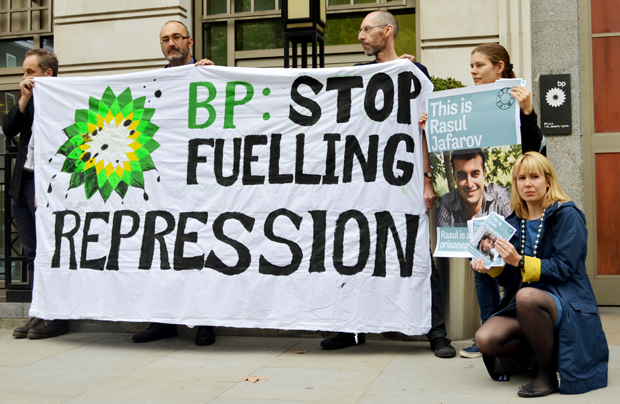
Protest outside BP HQ in London (Photo: Dave Coscia)
Protesters called on global oil giant BP to reassess its connections with the regime in Azerbaijan at a gathering outside the company’s London headquarters.
This week marks the anniversary of the signing of the Contract of the Century, when BP began its 20 year relationship with the Aliyev family. The protesters argue that BP’s role in Azerbaijan has provided the former president, Heydar Aliyev, and the current president, his son Ilham, with considerable power and money, facilitating the country’s repressive regime and hampering democracy.
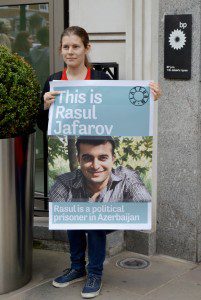
Claire James – Campaign against Climate Change (Photo: Dave Coscia)
There are currently 98 political prisoners being held in Azerbaijan and the threat of arrest others is also high. Recently, prominent activists Leyla and Arif Yunus and Rasul Jafarov have been jailed, as well as human rights lawyer Intigam Aliyev.
Ramute Remezaite, a human rights lawyer who worked in Azerbaijan, told Index on Censorship: “It’s very important to tell BP that it is totally intolerable to cooperate with the government of Azerbaijan, it’s repressing its own people and putting them to prison for reasons such as exercising their fundamental human rights.
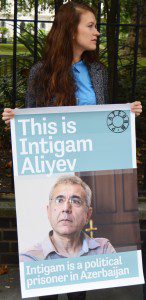
Ramute Remezaite – Human rights lawyer (Photo: Dave Coscia)
“Another reason why it’s very important to be here and to hold this action, is as solidarity with our colleagues in Baku because such an action is impossible these days in Azerbaijan — people standing in front of the BP office in Baku would be immediately arrested and sentenced to one, two, three weeks in prison.”
A group of Azerbaijani civil society organisations plan to send a letter to Bob Dudley, group chief executive of BP, demanding that the company call on the Aliyev government to release all political prisoners, and ensure that other prominent human rights defenders, such as Emin Huseynov, will not face arrest.
Emma Hughes from Platform London, who organised today’s protest, told Index: “We’re here today in solidarity with Azerbaijani civil society who are calling on BP to raise the case of the 98 political prisoners in Azerbaijan and also to drop their sponsorship of the 2015 Baku European Olympic Games.”
Also attending the protest, alongside Platform London and Index on Censorship, were representatives from Campaign Against Climate Change, Article 19 and BP or not BP.
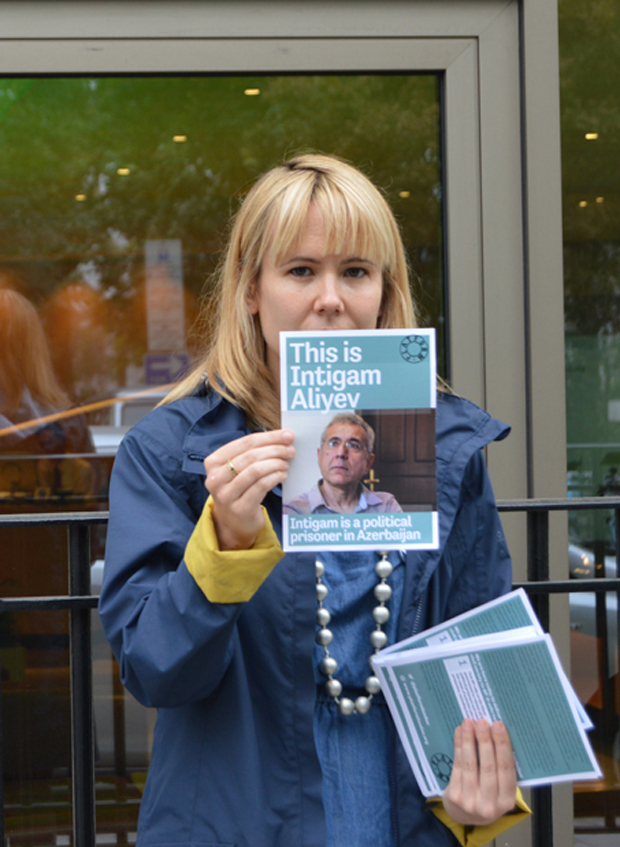
Emma Hughes – Platform London (Photo: Dave Coscia)
Claire James, from Campaign Against Climate Change, told Index: “I’m here partly in solidarity with political prisoners but also because our world’s addiction to fossil fuels is overcoming any common sense about what we’re doing to the planet and it should not also be overcoming human rights.”
In conclusion to the letter, Azerbaijani civil society asks that BP ceases its activities in the country until such times as a “democratic and accountable government is in power”.
This article was posted on 17 Sept 2014 at indexoncensorship.org
11 Sep 2014 | Draw the Line, Youth Board
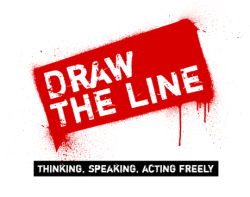
Free expression and policing can have an antagonistic relationship. Recent events in Ferguson are demonstrative of the issues that arise as the demands for protest clash with those for civil safety.
The police are naturally drawn to the forefront of such a debate as they become the physical manifestation of a state’s commitment to free expression and the right to protest. Thus, as the Obama administration launches a federal investigation into whether the Missouri police systematically violated the civil rights of protesters, it is prescient to ask whether one can demand more of the police to protect free expression.
Undoubtedly, enforcement agencies across the world play a tricky role in facilitating expression while protecting the legitimate safety concerns of the local community. Between 2009 and 2013, police in England spent £10 million on security arrangements for EDL marches. There can also be a huge social cost to galvanic protest and the director of Faith Matters, Fiyaz Mughal, has called for a ban on such marches, claiming that “[We] know there is a corrosive impact on communities, it creates tensions and anti-Muslim prejudice in areas. I think enough is enough. I think a banning order is necessary with the EDL”.
What the recent altercations in Ferguson illustrates is that the role of the police in safeguarding free expression must not be overlooked. More importantly, this is a global issue and as six activists being retried for breaching Egypt’s protest law have started an open-ended sit-in and hunger strike it must be remembered that this debate truly gets to the heart of the basic demands of any civic society.
As scenes from Ferguson have at times resembled the images of police crackdowns in Cairo it is clear that complacency about such issues can prove disastrous. It therefore seems vital to drawn certain lines as to where we feel the police should stand when it comes to creating the basis of a safe but also free society.
This article was posted on 11 Sept 2014 at indexoncensorship.org
4 Jun 2014 | Brazil, News and features, Religion and Culture
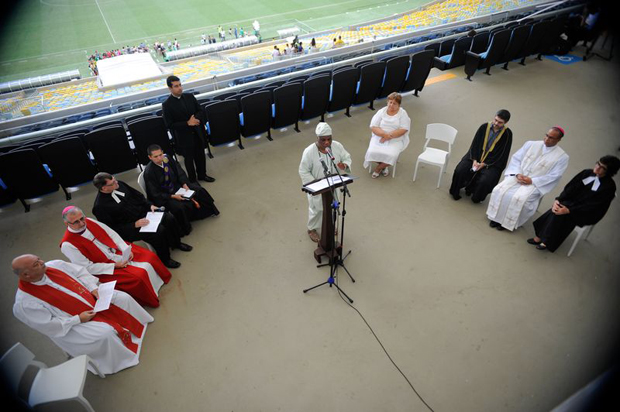
An inter-religious meeting at the Maracanã stadium in Rio de Janeiro to mark the beginning of the Peace Cup campaign (Tomaz Silva/Brazil Agency)
A request to remove 16 videos from YouTube has sparked a broad debate on the limits of freedom of speech and religious expression in Brazil. According to the complaint by the National Association of African Media, filed to the Regional Prosecutor’s Office of Rio de Janeiro (MPF), the videos encourage intolerance and prejudice against religious practices of African origin (Candomblé and Umbanda). The videos were posted by the Igreja Universal do Reino de Deus (IURD), a Neo-Pentecostal church.
The federal prosecutors from the MPF asked Google Brazil to remove the videos. But Google refused, arguing that the material disclosed “would be nothing more than the manifestation of the religious freedom of the Brazilian people” and that the videos “did not violate the company’s policy”.
On 17 May, the issue was taken to the federal court in Rio de Janeiro. There, judge Eugenio Rosa de Araújo denied the request for the removal of the videos. “Its contents are manifestations of free expression of opinion,” he stated. He argued that “the African-Brazilian religious practices do not constitute a religion” because “the religious manifestations (African) do not contain necessary traits of a religion”. He stated that a religion needs to have traits such as a baseline text (“as the Bible or the Koran”), a hierarchical structure and one God to be worshiped.
Notably, the ruling has two parts: the first determines that the videos are to be kept online, and is based on the right to freedom of expression. In the second part of the sentence, the judge defines what religion is, and excludes religions with African-Brazilian origin from this scope.
The representative of the Commission Against Religious Intolerance, Ivanir dos Santos, accused the judge of encouraging prejudice. “He is an employee of a laic State and is submitted to the Brazilian constitution and laws. He violated the constitution and the law against the racial discrimination.”
Facing such strong reaction, the judge Eugenio de Araujo Rosa went back on his decision. In a statement, he admitted he made a mistake and revised his sentence. “The strong support of the media and civil society demonstrates unquestionably the belief in the worship of such religions,” he said, referring to African-Brazilian beliefs.
But the original position of the judge is still causing reactions. The Order of Lawyers of Brazil repudiated the ruling, while the MPF has filed an appeal, arguing that “the decision mistreats the awareness, the honour and the dignity of millions of Brazilians who recognise themselves in these religions”. Protests by African-Brazilian culture organisations were held in at least seven cities. Leaders of all Brazilian beliefs gathered at Maracanã Stadium, calling for more peace and religious tolerance.
In addition, representatives from the MPF will file a lawsuit to the Superior Court of Justice (STJ), one of the highest organisations in the Brazilian judiciary system, against Judge Eugênio Rosa de Araújo. “Our intention is to remove the videos. It is not about freedom of expression, but about the spread of hatred,” said Santos.
On 28 May, the Federal Regional Court (TRF) received a petition with 1,000 signatures, demanding the removal of the videos. The petition was organised by the Commission Against Religious Intolerance and the National Association of African Media. The representatives of the afro culture argue the court’s decision to keep the videos on the internet violates the Universal Declaration of Human Rights, Article 129 of the Brazilian Constitution, and the Statute of Racial Equality (Law 12.288/2010). The statute stipulates that the government must protect the communities of African origin from hateful content in the media. The law forbids “the use of the media to disseminate images and contents that expose a person or group to hatred or contempt on the grounds of religion with African roots”.
FuA national demonstration against prejudice towards African-Brazilian religions has been scheduled. The event is organised by various associations for the defence of black culture, with the support of the Order of Lawyers of Brazil, the National Council of Justice (CNJ), the Human Rights Commission of Congress national and the Organization of American States (OAS). In congress, the Parliamentary Front in Defence of “Traditional Peoples of Terreiro” was created, aiming to institutionalise the defence of religions of African origin. The bloc will be a counterpoint to the Evangelical Parliamentary Front, which brings together 77 congressmen who form the base of support for the government of Dilma Rousseff.
“The theme is of utmost importance, because [it] involves guarantees which the constitution itself assures. I hope that it resolves itself quickly,” the President of the Federal Court, Sérgio Schwaitzer, told the Jornal do Brasil.
According Edson Santos, the deputy of PT (Workers Party) and former minister of racial equality, the judge encouraged the prejudice against African-Brazilian sects. He argued that the magistrate will be denounced at the National Council of Justice. “The decision was absurd and deeply regrettable, because it hurts the constitution”, he told to the newspaper Folha de S. Paulo.
“This conflict of law is challenging and raises questions about the limits of freedom of expression,” said Professor of Philosophy of Law José Rodrigo Rodriguez, of Law School of São Paulo from the Fundação Getúlio Vargas. Analysing the topic in an article, he argues that “one can say, without fear of any excess, that the decision has a clear discriminatory effect, despite the certainly good intention of the judge”.
This article was posted on June 4, 2014 at indexoncensorship.org







